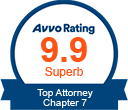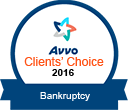Chapter 13 Bankruptcy Attorney in Long Beach
Schedule a Free Consultation: Call (562) 436-5456
Chapter 13 bankruptcy is the only reorganization chapter available to most individuals.
Chapter 11 bankruptcy is generally too expensive and cumbersome for individuals,
and the creditors have to vote on the reorganized payment plan. In a Chapter 13 bankruptcy,
however, the creditors don’t get to vote on the repayment plan:
The Chapter 13 is forced on them unless they have a valid objection.
In a Chapter 13 bankruptcy, you are reallocating your cash flow in a way that leaves you debt-free at the end,
and that is also fair to your creditors. You pay back creditors over the course of three to five years through monthly payments.
Crafting this Chapter 13 payment plan is a complex process, one that requires an experienced bankruptcy lawyer to help you navigate each step.
- Why Choose Our Long Beach Bankruptcy Lawyer?
- Reasonable Rates & a Free Attorney Consultation
- Internet Appointments Offered for Your Convenience
- A Law Firm Dedicated to Bankruptcy Since 1995
Call (562) 436-5456 today to learn more about your debt relief options in a
FREE consultation.
Creating the Chapter 13 Repayment Plan
Your monthly payment is determined by what you can afford to repay after paying your reasonable and necessary expenses.
For debtors under the median income, this is a simple budget you put together based on your
income versus the allowable expenses. For families over the median income,
the budget is a complex calculation that uses the IRS Offer in Compromise standards combined with your actual expenses for secured debt,
such as your mortgage and car.
Before signing off on the Chapter 13 plan, a judge will hear from your attorney and the Chapter 13 Trustee at a “Confirmation Hearing.”
When all has been resolved the judge will state the basic terms of your plan into the record.
Then you just make the monthly payment. At the end of the plan term, you will receive a debt
discharge just like in
Chapter 7 bankruptcy.
Chapter 13 Bankruptcy Instead of Chapter 7 Bankruptcy
Unlike a Chapter 7 case, the Chapter 13 bankruptcy does not bring your assets into potential liquidation as long as you pay back more than you would in a Chapter 7, even if it is only by one dollar more.
The Disadvantages of Chapter 13 over Chapter 7
- Chapter 13 cases last longer.
- Your credit score improves much slower.
- It is more administratively burdensome than Chapter 7.
- You are on a budget for the term of the plan.
- The net costs are likely higher, unless you’ve lien stripped a mortgage.
- The discharge is riskier because it depends on your performance over an extended period of time.
The Advantages of Chapter 13 over Chapter 7
-
You can
catch up on mortgage payments, which helps you keep your house.
- You can strip off a completely unsecured second and/or third mortgage. *
- You can repay non-dischargeable taxes without incurring any further interest or penalties.
- Your out-of-pocket attorney fees are often less.
- Some debts that are not dischargeable in Chapter 7 are dischargeable in Chapter 13.
-
Student loans are repaid in Chapter 13 along with credit cards and other unsecured debts, making the net effect of having to make payments much more tolerable for professionals with large student loan debt.
-
Under new laws, you can now
save for retirement in a Chapter 13 plan, so you need not get behind on your retirement savings while managing your debt.
*Your house may have become worth less than the loan amount owed on the 1st mortgage. In that case, the 2nd mortgage has no equity and is just like a credit card. Upon completing your Chapter 13 plan, the mortgage cannot be enforced. This means much more practical debt relief.
Discover if Chapter 13 bankruptcy is right for you: Call (562) 436-5456 or
email our Long Beach bankruptcy firm today!





